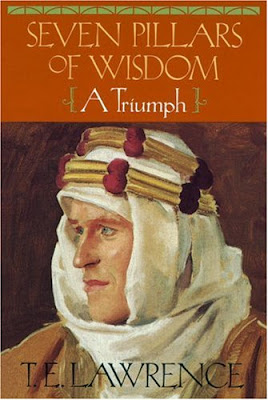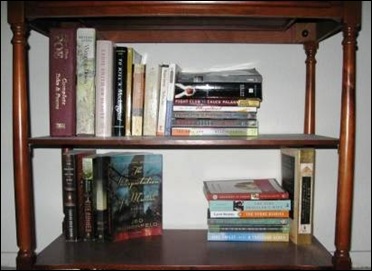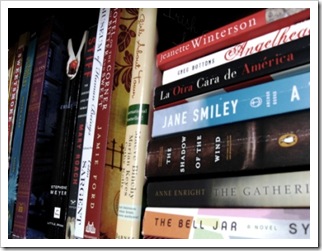Sunday Salon: Discovering T.E. Lawrence
Well, as true as one would expect of a memoir written after the fact, albeit fairly soon afterwards.
I am entranced with his account and amazed I had never heard of it until now. Thanks to The University of Adelaide Library and Project Gutenberg works like this can be read online or downloaded free.
The catalyst was coming across the movie while channel flipping and I simply had to stop and admire the breathtaking handsomeness of a young Peter O’Toole as well as a delicious looking Omar Sharif.
One particular scene, one that has always stuck in my mind, just happened to be on and I felt compelled to check on its veracity. Of course, it turned out to be true, as Lawrence recounted the event vividly in Seven Pillars of Wisdom.
I think many may guess which one. For me, it is one of the most powerful scenes ever filmed. It was from this that I did some research and learned that same sex rape of prisoners by the Turks was nothing new, not in their culture, nor in history.
If some of you cannot recall, Sherif Ali (Omar Sherif) is waiting outside the barracks where Lawrence (O’Toole) has been taken. He is well aware of what is happening behind closed doors. Throughout this scene, no words are spoken by the main characters, but much is said through the showing of emotion on Sharif’s face as he waits knowing there is nothing he can do. He plays the part so well, you can almost feel the pain of both men: one being beaten and raped, the other agonizing over his inaction.
Later, Lawrence is thrown into the mud, discarded as nothing more than refuse. Sharif races to him, helping him up, and then helping him heal…but he never did. Lawrence lived the remainder of his life acting out the classical symptoms of those who have suffered in such a way.
So how did this lead to my discovery? I wanted to know the truth behind the film. As we all know, movies based on true stories are purely that – “based” – as not much about the movie other than the premise turns out to be true.
This is how I learned about Seven Pillars of Wisdom and decided to take a look for myself about what actually happened.
This is also how I discovered an autobiography that not only holds my attention, but am anxious to read through. It is not a complete autobiography, just a recounting of his time as a British Officer during the Arab revolt against the Ottoman Turks.
Here are a couple of excerpts that drew me in immediately:
The body was too coarse to feel the utmost of our sorrows and of our joys. Therefore, we abandoned it as rubbish: we left it below us to march forward, a breathing simulacrum, on its own unaided level, subject to influences from which in normal times our instincts would have shrunk. The men were young and sturdy; and hot flesh and blood unconsciously claimed a right in them and tormented their bellies with strange longings. Our privations and dangers fanned this virile heat, in a climate as racking as can be conceived. We had no shut places to be alone in, no thick clothes to hide our nature. Man in all things lived candidly with man.
Blood was always on our hands: we were licensed to it. Wounding and killing seemed ephemeral pains, so very brief and sore was life with us. With the sorrow of living so great, the sorrow of punishment had to be pitiless. We lived for the day and died for it. When there was reason and desire to punish we wrote our lesson with gun or whip immediately in the sullen flesh of the sufferer, and the case was beyond appeal. The desert did not afford the refined slow penalties of courts and gaols.
Also, a little trivia: From my research, the second version of this book (the first was lost) was about 400,000 words which Lawrence reportedly wrote in three months time. For us NaNo people, that equates to over 133,000 a month!
I said in my last post that I wanted to read more. Well, I guess my wish is coming true a lot sooner than I imagined. It also shows me that some things simply cannot be planned. T.E. Lawrence nor anything he has written was ever on my radar. But this opportunity has presented itself for a reason and I am running with it.
My hopes, in sharing this experience with you, is to point out that when it comes to literary things, always have an open mind and a willing attitude as you never know when you might find something wonderful to read as well as learn something new about history and a society of which you were unaware.
Is there such a thing as literary archeology? Because I feel like I have dug around and found a treasure, buried beneath time, waiting for revelation and someone to appreciate it for what it has to offer.
Yeah. I’m weird that way.






